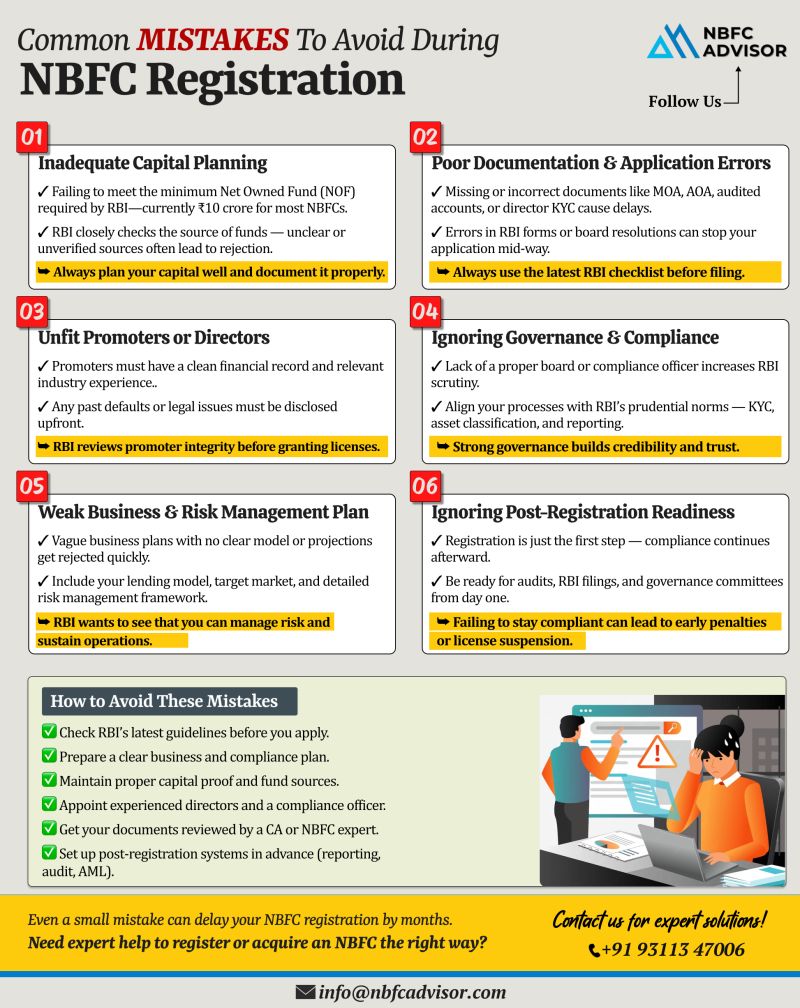Why Many NBFC Applications Get Rejected by the RBI — Avoid These Common Mistakes
Meta Title: Why NBFC Applications Get Rejected by RBI | Common Mistakes & Compliance Checklist
Meta Description: Learn why NBFC applications get rejected by the RBI. Avoid common mistakes like unclear fund sources or incomplete documentation. Get expert NBFC registration help.
Introduction
The Non-Banking Financial Company (NBFC) sector is one of the fastest-growing financial segments in India, offering innovative credit, lending, and investment solutions. However, while many entrepreneurs and financial startups aspire to obtain an NBFC license from the Reserve Bank of India (RBI), a significant number of applications face rejection — not because of weak business models, but due to minor compliance and documentation errors.
Even a small oversight in your application can delay approval for months or lead to outright rejection. Understanding the common pitfalls before applying can save both time and resources.
Why Do NBFC Applications Get Rejected?
-
Incomplete or Incorrect Documentation
One of the most common reasons for rejection is missing or inaccurate paperwork. Key documents such as the MOA (Memorandum of Association), AOA (Articles of Association), audit reports, or KYC details must be complete and consistent. Even small mismatches can raise compliance issues. -
Unclear Source of Funds
The RBI requires a minimum Net Owned Fund (NOF) of ₹10 crore, and the source of this capital must be clearly disclosed and traceable. Lack of clarity or unsupported fund sources is one of the top reasons for application rejection. -
Unfit Directors or Promoters
The RBI’s “fit and proper” criteria evaluate directors and key management personnel for financial integrity, experience, and reputation. Any history of financial default or regulatory non-compliance can make the promoters unfit for licensing. -
Weak Business and Risk Management Plan
A vague or unrealistic business model, financial projection, or risk plan indicates poor preparation. RBI expects applicants to demonstrate a well-thought-out and sustainable NBFC business strategy. -
Lack of Governance & Compliance Systems
The RBI places strong emphasis on corporate governance, internal audit, and compliance systems. A weak or non-existent framework can immediately raise red flags during the approval process.
Your NBFC License Application Checklist
Before submitting your NBFC application, ensure you have the following in place:
✅ Maintain a ₹10 crore Net Owned Fund with clearly traceable sources.
✅ Submit all required documents — MOA, AOA, audit reports, and KYC.
✅ Prepare a clear and detailed business and risk management plan.
✅ Ensure all directors meet RBI’s fit & proper criteria.
✅ Establish strong governance and compliance mechanisms.
✅ Seek professional advisory support to avoid costly mistakes.
The Importance of Professional Guidance
Even the most promising NBFC proposals can face rejection due to minor compliance oversights. Engaging a professional NBFC consultant or financial advisor ensures your application meets RBI’s rigorous standards — from documentation to due diligence and compliance review.
At Induce India, we specialize in NBFC registration, takeover, and compliance advisory. Our experts guide you through every step — from preparing documentation to representing your case before the RBI — ensuring a smooth and successful licensing process.
Conclusion
Securing an NBFC license is a major milestone — but it requires precision, transparency, and regulatory discipline. A little preparation today can save you from months of delay or rejection tomorrow.
📞 Need expert help with NBFC registration or comp
Contact us for a free consultation!
📱 +91 93113 47006
#RBI #Compliance #FinancialServices #NBFC #Fintech #RegulatoryCompliance #NBFCRegistration

